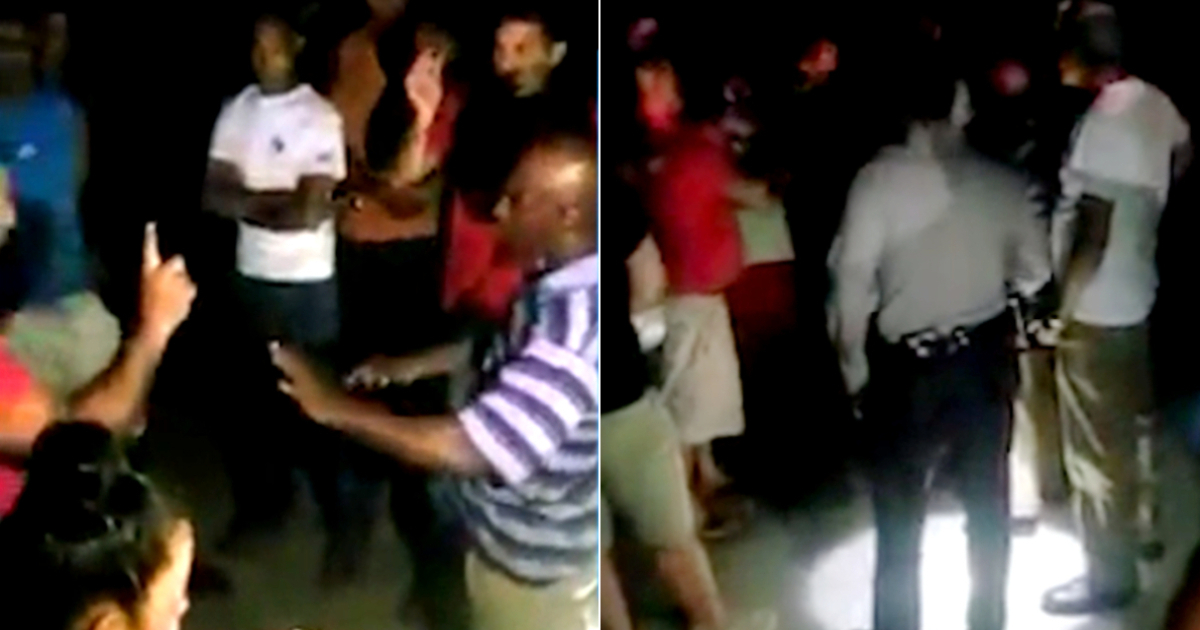
A military court of the Cuban regime sentenced eight protesterswith sentences of up to nine years in prison for participating in aprotest in July 2022 during prolonged blackout in the Covadonga Popular Council, in the municipality of Aguada de Pasajeros, in Cienfuegos.
The sentence, to which the agency had accessWHICH, indicates that the eight men between 19 and 63 years old who were tried were mostly found guilty of the alleged crimes of public disorder and contempt.
Issued by the Criminal Chamber of the Central Territorial Military Court, sentence number 13 of 2023, establishes prison sentences of between 2 and 9 years in prison for seven of the accused and "two years of correctional work with confinement as an alternative to deprivation of liberty, to be served in a penitentiary establishment" for the eighth defendant.
In addition, the court decided to impose as an "accessory sanction" the "deprivation of rights" for a period equal to the sentence. While serving their sentence and until they pay the "civil liability" imposed, those convicted will not be able to apply for a passport or leave the national territory.
The ruling, to which the aforementioned agency had access, indicates that the lieutenant colonelWuilder Pérez Gamboaacted as judge, while lieutenant colonelJosé Antonio Comas Llanes He served as a prosecutor.
In his sentence, Pérez Gamboa considered it proven that several of the convicted people started a protest in Covadonga following a blackout on the night of July 30, 2022, which brought together between 600 and 700 people.
In addition, the document states that during the protest insults were shouted against Miguel Díaz-Canel, and the crowd marched shouting "Homeland and Life."
According to the military court, there were also cases of Sabotage and Robbery with force in a store in MLC. This point was denied by sources who declared toMartí News that the crowd that came out to protest that day was immense and their anger was expressed against a freely convertible currency (MLC) store, where material damage was caused, but no items were stolen.
The protest at the Covadonga Popular Council occurred in the context of otherdemonstrations of discontent of the Cuban population, who at that time sufferedfrequent and prolonged power outages, sometimes more than twelve hours a day.
Cacerolazos and protests in the streets were seen in towns and cities of the country, especially in Havana, where the authorities gave the order torepress them with violence.
The demonstrations in Covadonga ended with the arrest of more than 60 people on the first day, and in the following days the number rose to 200, according to data from independent organizations, cited byMartí News, which highlighted that a billboard welcoming the town with an image ofFidel Castro It was also destroyed.
Among those convicted are citizensPedro Caride Santana, Marcos González Castro, Jose Armando Chestnut Terrer andDagoberto Escobar Sosa, who were accused of sedition and contempt. For its part,Gianny Betancourt Leiva andSeify Carmona Mendez They faced accusations of sedition, contempt and sabotage.
“You have abandoned an entire country, because it is not this town… it is the entire Cuba,” one of the neighbors told the authorities during the protests, according to images shared on social networks. “The problem is not the current…. It is misery and hunger,” another young woman stated bluntly."We are tired"; “How long?”, “They have no morals”, “We are suffocated”, others shouted.
In a television appearance in June 2022, the rulerMiguel Diaz-Canel admitted being aware of the climate of growing popular discontent due to the constant blackouts, and assured that his governmentintended to control the energy capacity during the summer.
A few weeks after these statements and in the midst of the worsening of the situation and the local outbreak of some citizen protests, the rulerHe asked Cubans not to protest the lack of electricity, ensuring that doing so would be responding to alleged destabilizing plans against the government.
In a statement issued around that time, the organization Justicia 11J stated that the protests responded directly “to both the energy and economic crises in the country (among others, systemic or structural), as well as the lack of freedoms and the rejection of figures of political power and the limited avenues for participation.”
What do you think?
SEE COMMENTS (1)Filed in: